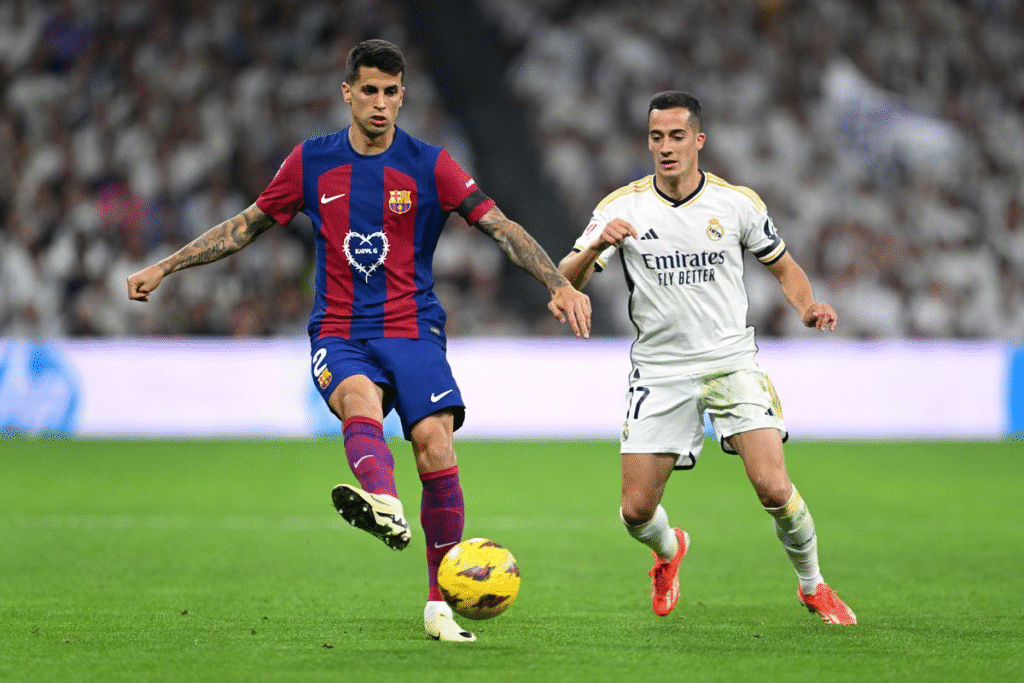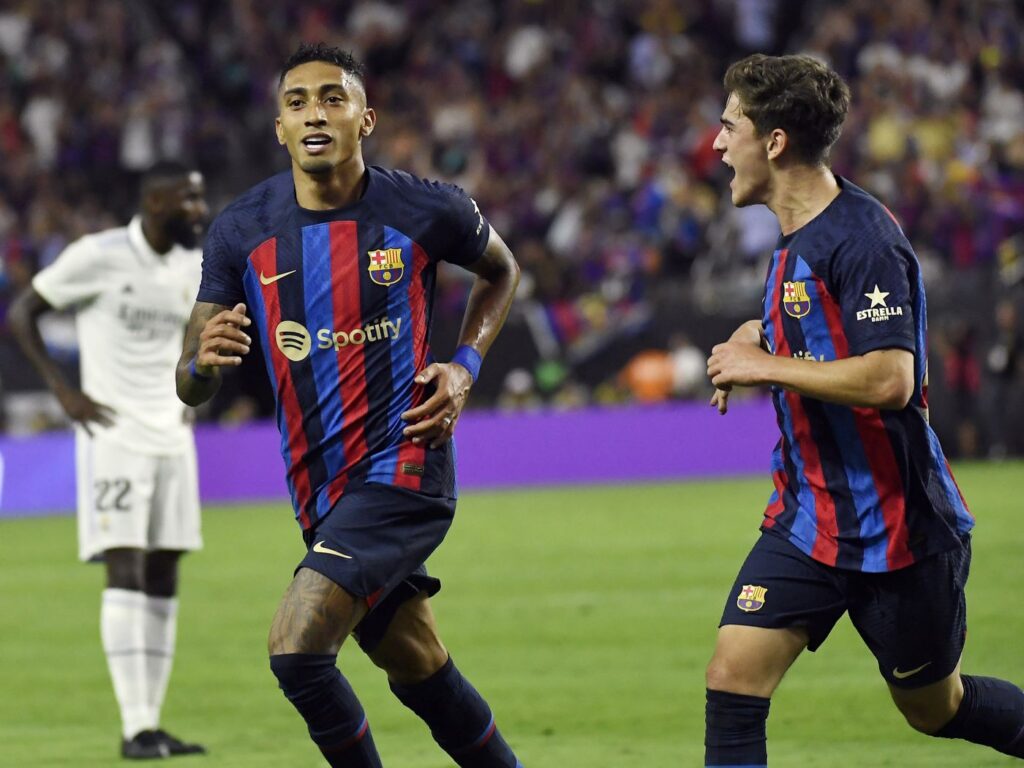
El Clásico, one of the most electrifying rivalries in football history, never fails to deliver drama, passion, and intrigue. The latest installment of this historic clash between Barcelona and Real Madrid, held on a gripping evening, was no different. However, one major talking point overshadowed the build-up to this match: the absence of Robert Lewandowski in Barcelona’s starting lineup. The Polish talisman, who has been the centerpiece of Barcelona’s attacking prowess since his arrival, was surprisingly missing from the starting eleven.
A Shocking Tactical Decision or a Forced Absence?
Fans and pundits alike were left stunned as the team sheets were revealed, with Lewandowski’s name absent. Speculation quickly spread, ranging from tactical reshuffling by Xavi Hernandez to possible injury concerns. The iconic striker’s ability to turn games around with his sharp instincts and clinical finishing made his omission a hot topic. Was it a bold tactical experiment from Xavi, or was Lewandowski sidelined for reasons beyond football?
Sources close to the club soon clarified that Lewandowski’s absence was due to a minor fitness issue that the club’s medical staff did not want to aggravate. Barcelona’s camp decided to prioritize the player’s long-term health over short-term gains. Nevertheless, the decision raised eyebrows, especially considering the stakes involved in El Clásico.
Lewandowski’s Impact Since Joining Barcelona
Robert Lewandowski’s transfer to Barcelona from Bayern Munich marked a new era for the Catalan club. The prolific striker quickly adapted to La Liga’s demands, becoming a linchpin in Barcelona’s attack. Known for his impeccable positioning, extraordinary finishing skills, and ability to link up with teammates, Lewandowski has been a consistent performer.
In the ongoing season, he has already registered a remarkable tally of goals, proving his mettle as a dependable goal scorer. Beyond statistics, his presence on the pitch offers a psychological advantage to his teammates and adds an element of unpredictability to Barcelona’s attack. His absence in El Clásico undoubtedly raised concerns about how Barcelona would cope without their star forward.
How Barcelona Lined Up Without Lewandowski
Xavi Hernandez had to think on his feet to restructure Barcelona’s attack. Without Lewandowski, Barcelona fielded a front line that relied heavily on the agility of wingers and the creativity of midfielders. Players like Ferran Torres, Ansu Fati, and Ousmane Dembélé were tasked with filling the void left by the Polish striker. Additionally, Xavi placed immense faith in the midfield trio of Pedri, Gavi, and Frenkie de Jong to control the tempo of the game and create opportunities.
The tactical reshuffle also saw Barcelona adopting a more fluid approach, with players interchanging positions frequently to confuse Real Madrid’s defense. While this strategy showcased Barcelona’s depth and versatility, the absence of a natural goal scorer like Lewandowski was felt in the final third.
Real Madrid’s Response to Lewandowski’s Absence
Real Madrid’s manager, Carlo Ancelotti, acknowledged the advantage of facing a Barcelona side without Lewandowski but cautioned his players against complacency. “Barcelona is a team of immense quality, and they have multiple players capable of stepping up in big games,” Ancelotti remarked during the pre-match press conference.
The Madrid defense, led by the experienced David Alaba and Eder Militao, adjusted their strategy to deal with Barcelona’s fluid attacking approach. Real Madrid aimed to capitalize on the lack of a focal point in Barcelona’s attack by pressing high and exploiting gaps in transition.
The Match Unfolds: Drama Without Lewandowski
Despite Lewandowski’s absence, the game lived up to the hype. Barcelona’s youthful exuberance, led by Pedri and Gavi, went toe-to-toe with Real Madrid’s experienced midfield of Luka Modrić and Toni Kroos. Both teams created several chances, with the goalkeepers, Marc-André ter Stegen and Thibaut Courtois, pulling off crucial saves to keep the game finely balanced.
Barcelona’s attack, although dynamic, missed the clinical edge that Lewandowski brings. Several opportunities went begging as the final touch lacked precision. Real Madrid, on the other hand, capitalized on their chances with Karim Benzema and Vinícius Jr. showcasing their class.
Lewandowski’s Influence Beyond Goals
Lewandowski’s contributions to Barcelona go beyond his impressive goal-scoring record. His ability to hold up play, draw defenders, and create space for teammates is invaluable. In matches against high-caliber opponents like Real Madrid, his presence offers a sense of assurance to the team.
The absence of such a player in El Clásico highlighted how much Barcelona depends on him. Youngsters like Ansu Fati and Gavi stepped up admirably, but the lack of a focal point in attack was evident. Lewandowski’s leadership and experience often galvanize the team, especially in high-pressure scenarios.
The Bigger Picture: Managing Player Fitness
Modern football demands a relentless schedule, with clubs competing in domestic leagues, cup competitions, and European tournaments. Managing player fitness has become a crucial aspect of team management. Lewandowski’s minor injury serves as a reminder of the physical toll that elite football takes on players.
Barcelona’s decision to rest Lewandowski, even for a match as significant as El Clásico, underscores their commitment to long-term goals. Xavi and his coaching staff recognize the importance of preserving their key players for the entirety of the season rather than risking exacerbating injuries.
The Tactical Lessons from El Clásico
Xavi’s tactical adjustments in the absence of Lewandowski revealed both strengths and weaknesses in Barcelona’s setup. The team’s ability to adapt showcased their depth and versatility, but it also highlighted the need for a reliable backup striker. While players like Ferran Torres and Ansu Fati possess immense talent, they lack the clinical edge and physical presence that Lewandowski brings.
Real Madrid’s approach to the game demonstrated their ability to exploit vulnerabilities in Barcelona’s reshuffled attack. Carlo Ancelotti’s tactical acumen was on full display as he instructed his players to press high and disrupt Barcelona’s build-up play. The match served as a valuable learning experience for Xavi and his young squad.
Will Lewandowski Return Soon?
The burning question on every Barcelona fan’s mind is whether Robert Lewandowski will return to action soon. Club insiders suggest that the injury is not serious and that the striker is likely to be available for Barcelona’s upcoming fixtures. However, Xavi and the medical team are unlikely to rush his recovery, given the packed schedule ahead.
The Polish forward’s fitness will be closely monitored, and his return will be timed to ensure he is at his best for crucial games, including European fixtures and the La Liga title race.
A Turning Point for Barcelona’s Season?
El Clásico often serves as a litmus test for both Barcelona and Real Madrid, reflecting their readiness for the challenges ahead. For Barcelona, the absence of Lewandowski highlighted areas that require improvement, particularly in terms of squad depth and tactical flexibility.
The match also emphasized the importance of resilience and teamwork. Players like Pedri, Gavi, and Frenkie de Jong showed tremendous character, stepping up in the absence of their star striker. Their performances offered a glimpse into the future of Barcelona, a team built on a foundation of youth and talent.
Fan Reactions: The Emotional Rollercoaster
El Clásico is more than just a football match; it’s an event that captures the imagination of fans worldwide. The news of Lewandowski’s absence sparked a flurry of reactions on social media, with fans expressing a mix of concern and optimism.
Barcelona supporters praised the team’s fighting spirit and resilience, while also lamenting the missed opportunities that could have changed the game’s outcome. Real Madrid fans, on the other hand, celebrated their team’s ability to capitalize on the situation and secure a crucial victory.
Conclusion: A Lesson in Resilience
Barcelona’s performance in El Clásico, despite Lewandowski’s absence, highlighted the team’s depth and adaptability. While the result may not have gone their way, the players’ determination and tactical flexibility offered glimpses of a promising future.
El Clásico is more than just a football match; it is a spectacle of emotions, strategies, and unforgettable moments. Lewandowski’s absence added another layer to this narrative, reminding fans of the unpredictability that makes football the beautiful game it is. As the season progresses, Barcelona will hope for a fully fit Lewandowski to lead their charge in domestic and European competitions.
For now, the spotlight shifts to how Xavi and his team navigate the challenges ahead while ensuring their star striker is back in action to continue mesmerizing football fans worldwide.
Looking Ahead: Barcelona’s Road to Redemption
The road ahead for Barcelona is fraught with challenges, but it also presents opportunities for growth. The team’s ability to adapt and evolve will be crucial as they navigate the complexities of a demanding season. With Lewandowski expected to return soon, Barcelona fans can look forward to a rejuvenated attack and renewed optimism in their quest for glory.
Final Thoughts
As the dust settles on another thrilling El Clásico, the focus shifts to the lessons learned and the road ahead. For Barcelona, the match was a reminder of their potential and the importance of resilience in the face of adversity. For Real Madrid, it was a testament to their experience and tactical prowess.
The absence of Robert Lewandowski was a key talking point, but it also highlighted the depth and character of a Barcelona side determined to compete at the highest level. As the season unfolds, fans can expect more twists and turns in the captivating saga of Spanish football.
Unpacking the Wider Implications of Lewandowski’s Absence
Beyond the tactical and emotional implications of Lewandowski’s absence, this situation reflects the broader challenges faced by elite footballers and their clubs. The demands of modern football, combined with the physical toll of a packed schedule, underscore the importance of strategic squad rotation and fitness management. Barcelona’s handling of Lewandowski’s minor injury

